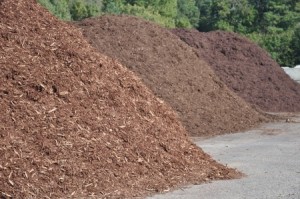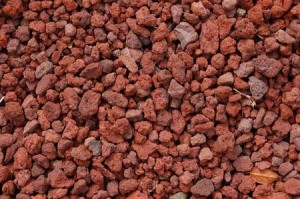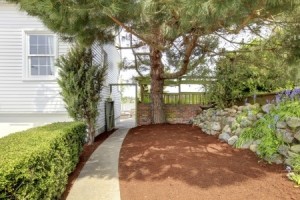The best mulch is one that fits your landscaping needs both functionally and aesthetically. Every type of mulch has its strengths and weaknesses, making some mulch more suitable for certain environments than others. Mulching is not just about making garden beds more pleasing to the eye, but mulching also provides a multitude of practical benefits to the landscape as well.
Mulches are typically used as a soil covering. Here are some different uses:
- Heat trapping
- Creates pathways
- Weed control and prevention
- Protects roots from fluctuating
- Protects roots from extreme temperatures
- Water preservation and moisture retention in roots and soil
- Aids in soil erosion control by keeping the soil in place during storms
Mulch is both an appealing “finishing touch” and a vital part of landscape management because of its ability to control weeds and retain soil moisture. Despite which mulch you choose, they are all equally as efficient, it just depends on your taste. Below are some of the benefits and weaknesses of the mulches commonly offered, so you can intelligently decide which one best fits your landscape needs.
- Pebble Mulch: Mostly Useful for Pathways, Walkways, and Driveways
- A benefit of pebble mulch/gravel is that it allows water to drain through, which is impossible for cement and asphalt to do. Although, a downside is that the little pebbles/gravel are very easily pushed out of their intended area, if they are not restricted by a surrounding

- A benefit of pebble mulch/gravel is that it allows water to drain through, which is impossible for cement and asphalt to do. Although, a downside is that the little pebbles/gravel are very easily pushed out of their intended area, if they are not restricted by a surrounding
- Rock Mulch: Typically used in perennial flower beds or other perennial plantings
- Large rocks soak up even more heat from the sun during the day, creating larger warm micro-climate areas than pebble mulch, depending on the size, quantity, and color. A nice spread of larger stones will also help prevent soil erosion to a certain extent. It is smart to invest in local rock if you can, as moving rocks can be more difficult to transport than other mulch options.
- Pumice Rock Mulch: Usually used in Flower Beds and other Perennial Garden Beds
- Pumice rock is an extremely lightweight, porous rock that is made from volcanic eruptions. This mulch has the ability to catch and absorb moisture, because it’s so porous, which none of the other rock mulches have the ability to do. Since pumice is quite permeable, it will absorb some heat from the sun, but not as much as the other rock mulches.
- Wood Chips/ Shredded Bark: Used to insulate plant roots, especially in fluctuating temperatures
- Hardwood mulch contains a high carbon-to-nitrogen material, which means that they work exceptionally well if you use them on top of the

- Hardwood mulch contains a high carbon-to-nitrogen material, which means that they work exceptionally well if you use them on top of the
- Pine Straw Mulch: Extremely Economical Option that will last forever
- Pine straw mulch comes from pine tree needles, which are raked and baled for use as mulch, so the product is renewable and is naturally sourced. Throughout heavy rain, pine needles tend to stay put and not wash away, making them the ideal choice on slopes. It’s also readily available in the South, so it’s an excellent viable addition to any Atlanta property.
All of these mulches work great depending on your specific needs. Whichever mulch you choose, it will immediately improve your landscape’s appearance and health. The experts at Mansell Landscape Management can help you choose the right mulch for your property. Mansell Landscape has designed and overseen hundreds of landscape transformations. If you are interested in our landscape maintenance services, contact us today or visit our website for more information.


